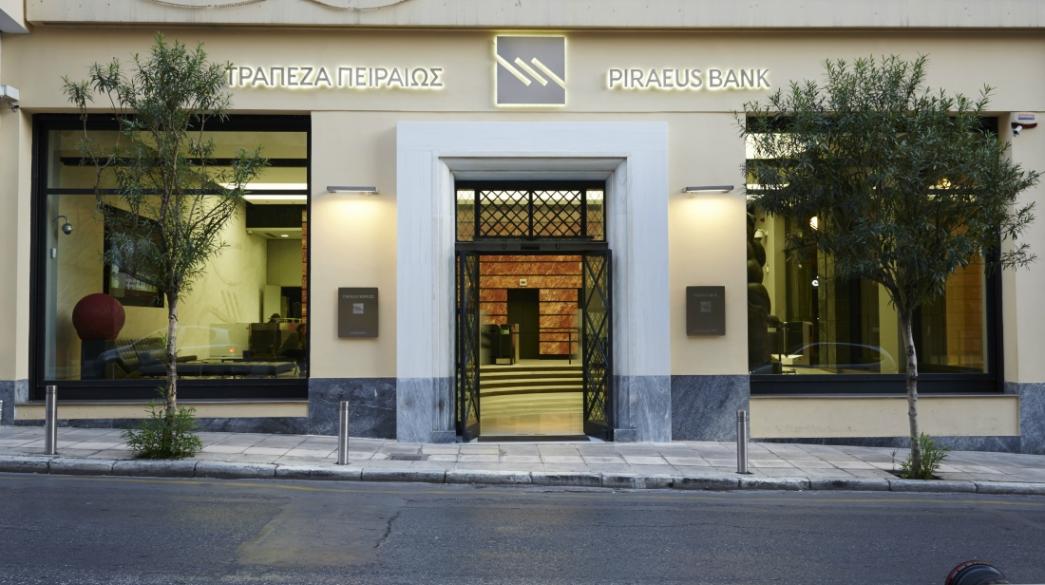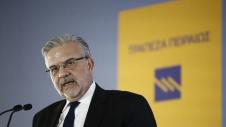The management of Piraeus Bank has unveiled a new action plan to consolidate its balance sheet, after the strengthening of its capital from the conversion of CoCos into shares.
2021, according to what CEO Christos Megalou told analysts yesterday, will be a key year for reducing non-performing exposures, which is estimated to reach 12 billion euros in total, adding that a new share capital hike would not be needed.
The conversion of CoCos into shares, which is expected to be completed before the end of the year, adds more than 2 billion euros to the core capital of Piraeus Bank, while 495 million euros will be saved by 2022 by avoiding the payment of coupons, widening the margin to absorb losses from the liquidation of non-performing loans.
As Megalou mentioned, the bank's management is working on a new plan, a more aggressive reduction of non-performing exposures, which will be presented at the beginning of next year, together with the announcement of the 2020 financial results.
According to initial estimates, in addition to the two major securitizations (Vega - loans of 5 billion euros, Phoenix - loans of 1.9 billion euros), which are already being completed and will bring results in 2021, an additional reduction of non-performing loans is planned (with securitizations and other instruments) of at least 5 billion euros, which means that Piraeus Bank will be on course to meet goals set by supervisory authorities to slash bad debt to single digits in coming years.
Megalou yesterday gave a first answer to the issue of how the bank will be able to secure the additional funds needed to support the consolidation of the portfolio. A question that had recently prompted talk of a share capital increase that would hit existing shareholders.
The CEO said that scenarios for raising funds from shareholders are off the table, at least for 2021, as there is the possibility of raising funds needed to support the consolidation of the balance sheet by other means, which includes the issuance of Tier 1 bonds (income is calculated in the basic regulatory capital) or Tier 2 within the next year.
Megalou also explicitly ruled out the possibility, after the conversion of CoCos into shares and the further increase of the Hellenic Financial Stability Fund's stake beyond 61%. "There is no thought of securing state support as a result of the conversion of CoCos," he said.
The ways to strengthen the bank’s capital adequacy, by 1 + 1 billion euros, as presented to analysts yesterday, are a total of six:
- From the separation of the bank's activity in the card sector, within the first quarter of 2021, the benefit will be approximately 300 million euros.
- From two transactions of loan securitizations, which will take place in the first and fourth quarter of 2021, in order to reduce the weighted assets, the benefit is estimated at 300 million euros.
- Another 100 million euros will come from the reorganization of the holding portfolio within the first quarter of 2021.
- From the savings through the non-payment of coupons for CoCos the benefit that will be registered next year will amount to 300 million euros. Thus, in total, from the above actions, the capital base will be strengthened by approximately 1 billion euros.
- In addition, 400 million euros will come from the recording of unrecognized profits from the bank's bond portfolio.
- Another 600 million euros will be added to the funds through debt issuance (Tier 1 and Tier 2 bonds), with Megalou stressing that this is an indicative amount, the amount of which will depend on the bank's forecasts for weighted assets. In any case, as stressed, it will be a mixture of issues that will not result in dilution for shareholders.
The additional funds that will come from the first category of capital assistance measures, amounting to 1 billion euros, can support the reduction bad loans by 5 billion euros. Through the funds that will be added from bond profits and debt issuance, the bank will create an additional "cushion" of capital adequacy, to absorb other losses, but also to prepare for the expiration of temporary measures to reduce supervisory requirements due to of the pandemic.
Regarding the effects of the pandemic on the creation of new NPEs, Megalou appeared moderately optimistic, saying that 75% of loans on which the payment freeze has lapsed, are being paid off as normal.
In particular, according to the data presented yesterday, out of a total of 5.3 billion euros in loans, which had been suspended in recent months, payment on 3 billion euros of loans remained frozen at the end of September.








